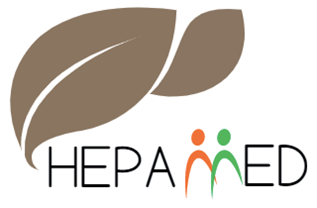Hepamed
2022 Update

HepaMed is a programme launched in 2018 by the Romanian Ministry for European Funds and co-financed by the 2014-2020 “Capital Uman” Operational Programme. The aim of the programme is to educate healthcare practitioners about prevention and treatment of hepatitis. The programme comprises three series of training courses: the first addressed infectious disease specialists, the second family doctors and the third will be rolled out in 2020 and will target nurses. For the purposes of this publication, we are focussing on the programme for family doctors.
Why?
In Romania hepatitis prevalence is relatively high among people with no specific risk profile such as people who inject drugs (PWIDs), the homeless, migrants or prisoners. For these people, family doctors are the first and often the only point of contact with the healthcare system, especially in rural areas. Family doctors therefore play a crucial role in diagnosing patients and referring them to the right specialists. However, family doctors often don’t have adequate knowledge of viral hepatitis, the appropriate use of diagnostic tests and interventions to treat patients with viral hepatitis. Therefore, educating family doctors on the risk factors for viral hepatitis (e.g. patient recipient of a blood donation before 1990) as part of the anamnesis, on disease symptoms, on the diagnostics tools available, as well as on therapy and referral options, is essential to identify the undiagnosed and ensuring that they can access appropriate care.
How?
The HepaMed programme involved professional training to increase the competencies of family doctors in the prevention and treatment of hepatitis. The training sessions included courses on how to prevent hepatitis transmission, on screening and diagnosis, and on the treatment of both hepatitis and its complications. The biggest novelty of the programme was the introduction of a psychological component to learn how to provide psychological support to people infected with hepatitis, with the goal of increasing patients’ adherence to treatment and helping them to adapt their lifestyle to their medical condition, ultimately improving their overall quality of life.
Cooperation
The project is implemented by the Clinical Hospital of Infectious Diseases Cluj in partnership with the University of Medicine and Pharmacy “Iuliu Hațieganu” Cluj-Napoca, the Clinical Hospital of Infectious Diseases Brașov, the Ovidius University of Constanta and the Clinical Hospital of Infectious and Tropical Diseases Victor Babes Bucharest.
Learnings
The project has managed to involve around 1,200 healthcare professionals from all over the country in training on prevention, diagnosis and treatment of viral hepatitis. An updated state-of-the-art good practice guide has been issued for each target group of the project (specialists, family doctors, and nurses). The project has also led to the exchange of national and transnational good practices, through participation in international conferences and the creation of an online platform.
Funding
Almost 85% of the project was funded through non-reimbursable financing provided by the European Social Fund. The remaining part was mostly funded through national grants (around 13% of the total budget), while the partnership only co-financed around 2% of the total budget for the project.
Contact
Marinela Debu, President APAH-RO
Telephone: 00 40 721/304160
Email: roapah@gmail.com, hepatobv@gmail.com